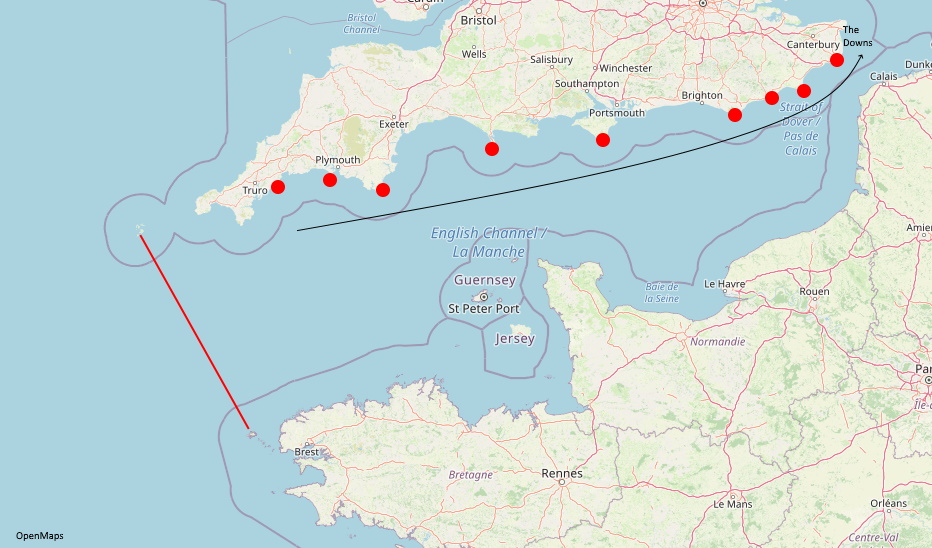In my occasional jaunts into the realms of piracy and at the odd shanty singing event, I have encountered a number of variants of the song “Spanish Ladies”. It is a naval song from the era of the Peninsula Wars allegedly sung by British sailors with little or no knowledge of the geography of the English coast. So here are what I think the correct words should be. I am sure almost nobody will agree but if you haven’t adopted a favourite version yet, hopefully this is a contender.
Why are the Ladies Spanish? With the British at war with Napoleonic France, Britain supported Spain’s land forces using its dominant Navy. This meant inevitably that those lowly ratings found themselves ashore in Spanish holdings for months at a time. Many no doubt found comfort in the arms of a local girlfriend, wife or dare I say it, women of negotiable virtue.
[Verse 1]
Farewell and adieu to you, Spanish Ladies
Farewell and adieu to you, ladies of Spain;
For we've received orders for to sail for old England
But we hope very soon we shall see you again
[Chorus]
We'll rant and we'll roar like true British sailors
We'll rant and we'll roar across the salt seas
Until we strike soundings in the channel of old England;
From Ushant to Scilly is thirty-five leagues
So let’s take a break here and cover the first contentious bit: How many (British) leagues is it from Ushant to Scilly? It is 33 and a bit. 35 seems a fair approximation. Ushant is the last bit of land a north sailing ship would pass before getting into the English Channel.

[Verse 2]
We hove to our ship with the wind from sou'west, me boys
We hove to our ship deep soundings to see;
So we rounded and sounded and got forty-five fathoms,
So we squared our main yard and up channel steered we
45 Fathoms is roughly 80m deep. The Channel itself goes as deep as 120m at the arbitrary line between Ushant and The Scilly (pronounced “Silly” not “Skilly”) Isles. 80m means the ship is sufficiently north that the depth is beginning to reduce, turning here makes sense if the plan is to head east along the length of the Channel.
[Chorus]
We'll rant and we'll roar like true British sailors
We'll rant and we'll roar across the salt seas
Until we strike soundings in the channel of old England;
From Ushant to Scilly is thirty-five leagues[Verse 3]
The first land we saw was called the Dodman
Next Rame Head off Plymouth, Start, Portland and Wight;
We sailed by Beachy, by Fairlight and Dug'ness
Until we're abreast of the South Foreland light
OK then, what are all these places they are singing about here? Dodman, Rame Head, Start, Portland, Wight and Beachy are all easy enough to find on a map. But then there is a bit of disagreement if you pass Dungeness or Dover. Well looking at a map makes Dungeness or Du’gness the obvious candidate. The “South Foreland Light” is bang next to Dover too and thus the port itself hardly seems worthy of a mention as a navigational point.
[Chorus]
We'll rant and we'll roar like true British sailors
We'll rant and we'll roar across the salt seas
Until we strike soundings in the channel of old England;
From Ushant to Scilly is thirty-five leagues
[Verse 4]
Then the signal was made for the great fleet to anchor
And all in the Downs that night for to see;
Stand by your stoppers, See clear your shank painter,
Haul up your clew-garnets, let out tacks and sheets.
A few things to cover here. The Downs is both a hilly area in Kent and Sussex but more usefully is also an anchorage around the coast of Kent near Deal, just north of the lighthouse we mentioned earlier.
The Shank Painter is a short rope or chain which holds the anchor to the side of the ship when at sea. The cat stopper is also a device for securing the anchor. So this is basically saying, to drop anchor.
A Clew-Garnet is a rope attaching to the lower triangular corner of a sail (clew). A tack is a square sail (or square corner of a sail) and a sheet (confusingly) is the rope the holds it by the corners. Letting out the tacks and sheets takes the wind out of them and slows the ship.
[Chorus]
We'll rant and we'll roar like true British sailors
We'll rant and we'll roar across the salt seas
Until we strike soundings in the channel of old England;
From Ushant to Scilly is thirty-five leagues[Verse 5]
Now let ev'ry man toss off a full bumper
And let ev'ry man toss off a full bowl
We'll drink and be jolly and drown melancholy
And here's to the health of each true-hearted soul
A “full bumper” was a mug or glass full to the brim with beer or grog. A “full bowl” would be dinner. Tossing off meant to simply finish eating/drinking with enthusiasm.
[Chorus]
We'll rant and we'll roar like true British sailors
We'll rant and we'll roar across the salt seas
Until we strike soundings in the channel of old England;
From Ushant to Scilly is thirty-five leagues